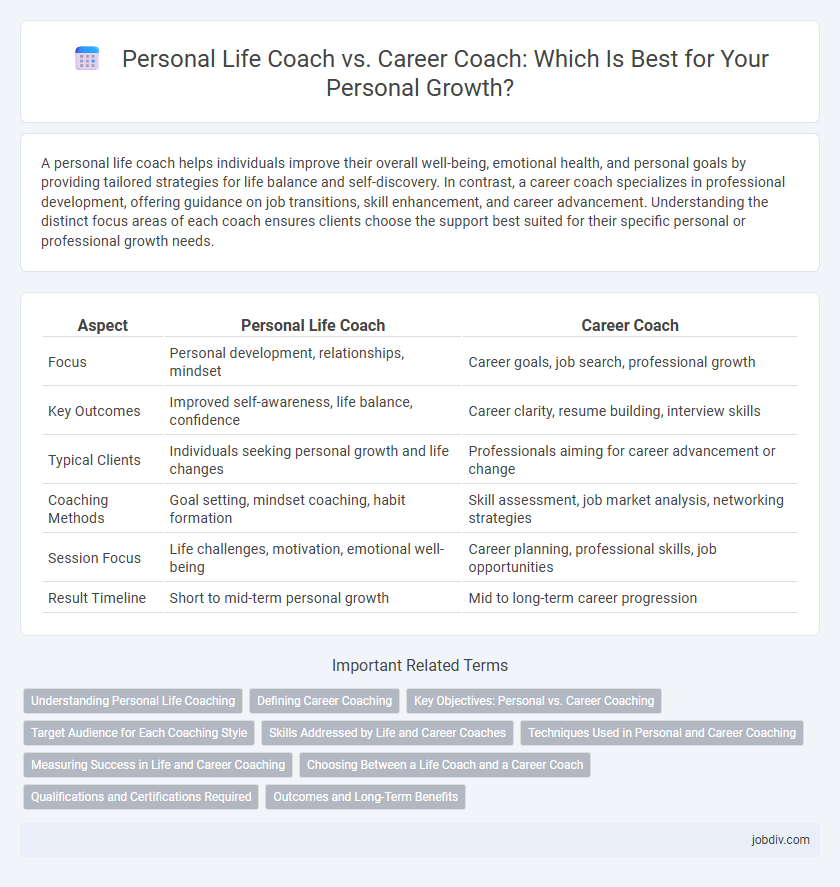A personal life coach helps individuals improve their overall well-being, emotional health, and personal goals by providing tailored strategies for life balance and self-discovery. In contrast, a career coach specializes in professional development, offering guidance on job transitions, skill enhancement, and career advancement. Understanding the distinct focus areas of each coach ensures clients choose the support best suited for their specific personal or professional growth needs.
Table of Comparison
| Aspect | Personal Life Coach | Career Coach |
|---|---|---|
| Focus | Personal development, relationships, mindset | Career goals, job search, professional growth |
| Key Outcomes | Improved self-awareness, life balance, confidence | Career clarity, resume building, interview skills |
| Typical Clients | Individuals seeking personal growth and life changes | Professionals aiming for career advancement or change |
| Coaching Methods | Goal setting, mindset coaching, habit formation | Skill assessment, job market analysis, networking strategies |
| Session Focus | Life challenges, motivation, emotional well-being | Career planning, professional skills, job opportunities |
| Result Timeline | Short to mid-term personal growth | Mid to long-term career progression |
Understanding Personal Life Coaching
Personal life coaching focuses on helping individuals achieve clarity in their values, improve emotional well-being, and enhance relationships, fostering overall life satisfaction. It addresses challenges related to personal growth, confidence, and work-life balance, guiding clients through self-discovery and goal-setting tailored to their unique lifestyle. Understanding personal life coaching involves recognizing its role in empowering clients to create meaningful life changes beyond professional aspirations.
Defining Career Coaching
Career coaching centers on guiding individuals to identify professional goals, enhance employability skills, and navigate career transitions effectively. It involves tailored strategies for resume building, interview preparation, and networking to maximize job market success. Unlike personal life coaching, career coaching prioritizes measurable outcomes related to career advancement and job satisfaction.
Key Objectives: Personal vs. Career Coaching
Personal life coaches primarily focus on enhancing emotional well-being, improving relationships, and fostering self-awareness to achieve a balanced and fulfilling lifestyle. Career coaches concentrate on professional development, goal-setting, skill enhancement, and navigating career transitions to maximize job satisfaction and advancement. Differentiating objectives helps individuals select the appropriate coaching type aligned with their personal growth or career ambitions.
Target Audience for Each Coaching Style
Personal life coaches primarily target individuals seeking support in achieving balance, improving relationships, or enhancing overall well-being, often appealing to those navigating personal growth or life transitions. Career coaches focus on professionals aiming to advance in their careers, develop leadership skills, or make strategic job changes, catering mainly to employees, executives, and entrepreneurs. Both coaching styles tailor their approaches to meet the specific goals and challenges of their distinct client bases.
Skills Addressed by Life and Career Coaches
Life coaches specialize in enhancing personal development skills such as emotional intelligence, goal setting, stress management, and work-life balance. Career coaches focus on professional skills including resume building, interview techniques, networking strategies, and career advancement planning. Both coaching types cultivate decision-making abilities and self-confidence to empower clients in their respective personal and professional spheres.
Techniques Used in Personal and Career Coaching
Personal life coaches employ techniques such as active listening, goal setting, and mindfulness practices to enhance overall well-being and personal growth. Career coaches specialize in skills assessment, resume building, interview preparation, and networking strategies to advance professional development and job placement. Both coaching types utilize motivational interviewing and accountability frameworks to ensure progress and success tailored to individual needs.
Measuring Success in Life and Career Coaching
Measuring success in life coaching often involves assessing improvements in personal wellbeing, emotional balance, and fulfillment, while career coaching success is gauged by achieving professional goals, skill development, and job satisfaction. Life coaches utilize tools like self-assessment surveys and progress journals to track personal growth, whereas career coaches rely on metrics such as promotions, salary increases, and expanded professional networks. Both fields emphasize goal attainment but differ in focus areas, with life coaching targeting holistic life enhancement and career coaching concentrating on career advancement.
Choosing Between a Life Coach and a Career Coach
Choosing between a personal life coach and a career coach depends on your primary goals; a life coach focuses on overall personal development, emotional well-being, and work-life balance, while a career coach specializes in job search strategies, professional growth, and career transitions. Assessing whether you need guidance in managing personal challenges or achieving specific career objectives helps determine the ideal coaching support. Understanding this distinction ensures tailored coaching that aligns with your unique life phase and ambitions.
Qualifications and Certifications Required
Personal life coaches typically hold certifications from organizations like the International Coach Federation (ICF) or the Certified Coaches Alliance, emphasizing expertise in emotional intelligence, goal setting, and lifestyle management. Career coaches often require credentials such as the Professional Certified Coach (PCC) or certifications from the Career Coach Institute, focusing on career development, job search strategies, and professional growth. Both roles benefit from accredited training programs, but career coaches generally require a deeper understanding of industry trends and recruitment processes.
Outcomes and Long-Term Benefits
Personal life coaches specialize in enhancing overall well-being, emotional balance, and personal growth, leading to improved relationships and self-awareness. Career coaches focus on professional development, job satisfaction, and skill enhancement, resulting in better career progression and workplace confidence. Both coaching types provide long-term benefits by fostering goal clarity, motivation, and sustained personal or professional fulfillment.
Personal Life Coach vs Career Coach Infographic

 jobdiv.com
jobdiv.com